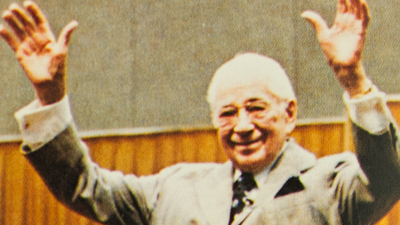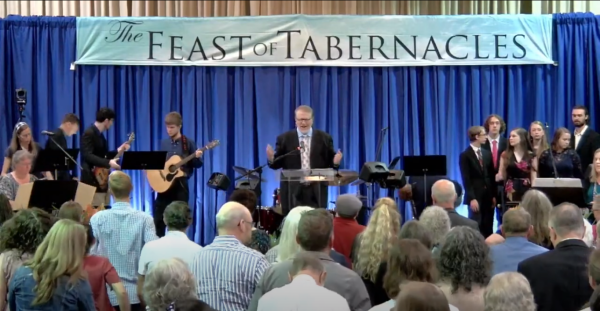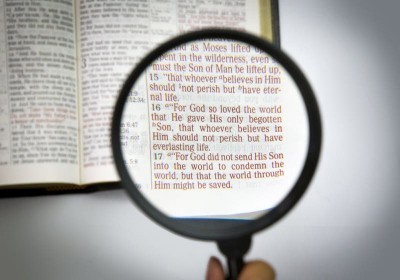
Wild-eyed Christian enthusiasts are quick to blast others who disagree with them as not being Christian.
A word of advice: If Christians have differing views on...
- how predestination and God's omniscience works with our free will, or
- whether God created the world in seven literal 24-hour days, or
- what precisely the two goats of Leviticus 16 foreshadow,
it's generally not wise to accuse them of being anti-Christ.
But neither should we make the mistake of thinking beliefs don't matter. Some make a world of difference.
What about COGs?

Can we apply the label “Christian” to the various COGs in the Armstrong tradition, such as the United Church of God (UCG); Church of God, a Worldwide Association (COGWA); Church of God International (CGI); Intercontinental Church of God (ICG); and all the rest?
We surely agree that the Church of Jesus Christ of Latter Day Saints (think Mormons) and The Watch Tower Bible and Tract Society (think Jehovah's Witnesses) are not Christian. We don't say that to insult any adherents of their respective religions. It's just an honest assessment of their theology, of how they view God — especially in the Person of Jesus Christ.
We have to judge honestly the theology of Armstrong COGs in the same way. While many of their believers may be sincere and decent people, here are five commonly held COG beliefs that lead me — a former COG believer — to objectively conclude these organizations cannot be properly called “Christian”:
- There are two Gods.
- Jesus was no longer God when he became man.
- Jesus could have sinned.
- The Creator ceased to exist.
- Jesus' body was not resurrected.
1. There are two Gods
This is a big one. Most COGs are quite comfortable saying outright that there are “two God Beings.” And many will say that one day, everyone who is eventually “born again” into God's family will also become a God Being. That means one day there may be millions of God Beings, even if they're always under the Father and Jesus Christ in “rank.”
Despite this, they recoil at being labeled “polytheists” (a term we apply to pagans), but what's a more accurate term to describe a belief in two or more God Beings?
Their teachers quickly respond by explaining there is only “one God Family.” That's the only sense in which they describe the “oneness” of God. To them it just means these multiple God Beings are united in purpose and plan, of the same mind, on the same team. These two separate God Beings are “one” in spirit.
But this does not answer for their more-than-one-God teaching. It is their sleight-of-hand way to make polytheism appear monotheistic.
Don't lose sight that there cannot be two or more “God Beings.” That's impossible.
Now it is helpful to clarify what we mean by the words Being and Person in a theological and philosophical context, because they can be synonymous in an everyday, conversational context. In short, “being” is a reference to something that exists, and “person” is a reference to who an existing something is.
So a rocking chair, for example, is a “being,” because it exists, but that rocking chair is not a person.
You, the reader, are also a “being” because you exist, but you're also a person, because in addition to being a something, you're a someone.
The Christian view of God is that he is one in Being, but more than one in Person.
This idea is beyond our limited imagination, because every day we see and interact with beings that are zero persons, and beings that are one person; but we never see beings that are more than one person. While we can't picture it in our minds, a being comprised of more than one person does not contradict logic, just as it is not illogical that some beings are persons and some beings are not.
COG teachers, on the other hand, clearly mean to express that there are two God Beings.
God is almighty. But if the Father is an almighty Being, and if the Son in his divinity is an almighty Being, then neither is almighty. There can't be more than one almighty Being. Almightiness is a superlative term; it doesn't allow for two or more. If one is almightier than the other, then the other is not almighty. And so the one who is not almighty is, by definition, not God.
Trinitarians, using nuanced terms to affirm both monotheism and the divinity of Christ, don't face this difficulty. They understand and explain that God is only one “What” (Being) and more than one “Who” (Person).
Any COG that says there are two or more Gods is not Christian.
What did the Early Church say?
Tertullian (A.D. 155-200), Adversus Praxeam – Against Praxeas, chapter 3

They are constantly throwing out against us that we are preachers of two gods and three gods, while they take to themselves pre-eminently the credit of being worshippers of the One God; just as if the Unity itself with irrational deductions did not produce heresy, and the Trinity rationally considered constitute the truth.
2. Jesus was no longer God when he became man
COGs give the strong impression they believe
- that Jesus was God in his preincarnate state;
- that Jesus was no longer God when he became man; and
- that Jesus was God again when he conquered death.
If Jesus was only a man (and not God) when he walked the earth, then we have to ask: How did his Roman execution benefit any of us? At most, we could consider him a martyr, not Savior of the world.
On the other hand, the historic Christian Church rightly understands that Jesus is at once fully God and fully man (a concept COGs often explicitly reject). He was, and remains, a divine Person with two natures: human and divine.
God cannot stop being God. As his existence is necessary for all else to exist (and continue to exist), the great “I AM” cannot become “I am not” even for a little while. He cannot go in and out of existence. That contradicts what it means to be eternal.
We have to realize the Word never stopped being God. If God can stop being God, then he was never God to begin with.
It is a contradiction of terms for the Self-Existent One to stop existing. It's as nonsensical as suggesting the all-powerful God can create a boulder so heavy that he can't move it. (While that proposal might be a stumper for children, we understand it is nonsensical — and God does not exist in a make-believe world of nonsense. He is not a God of self-contradiction.)
Any COG that says Jesus was no longer God when he became man is not Christian. We could not be saved by a mere man. We had to be saved by the God-Man.
What did the Early Church say?
Origen (A.D. 185-232), De Principiis, preface:

He in the last times, divesting Himself (of His glory), became a man, and was incarnate although God, and while made a man remained the God which He was; that He assumed a body like to our own, differing in this respect only, that it was born of a virgin and of the Holy Spirit...
3. Jesus could have sinned
I remember how my CGI pastor reacted when the mid-1990s WCG started saying Jesus could not have sinned. He would say if Jesus couldn't have sinned, then you have no Savior.
But the truth is just the opposite: You have no Savior if he could have sinned.
If we believe that Jesus was walking around as God in the flesh, as a divine Person who assumed a human nature, then we can't believe Jesus (as God) was able to sin. Just as God can't not exist, because he is necessary existence, so it is that he can't sin, because he is all-holy.
Sin is committed only by a person, through an act of the will, not by the body alone. It involves choice. Jesus is (and was) a divine Person with a divine will, and we know God cannot sin.
Just because Jesus was born with a human body, it does not follow that his divine Person could be overwhelmed with, and succumb to, temptation. His human and divine will were perfectly united. Keeping in mind that only persons (not mere bodies) can sin, if the divine Person of Jesus could have sinned 2000 years go, then he could sin now. But we know he can't sin now, because he's God — a divine Person. And there was never a time when he wasn't a divine Person.
COG leaders have even floated the idea that the Father and the Son took a huge cosmic risk in letting one of them become man. Had he failed through sin, there would have been only one of them left. The implications of this are absurd. For one, it would have cut the “God population” in half, and in such a predicament I would ask whether God the Father, as backup, could have stepped in where the Son failed in order to save the world. And what if he, too, failed through sin? Eternity would end (another contradiction of terms).
Any COG that says Jesus could have sinned is not Christian.
What did the Early Church say?
James the brother of the Lord (circa A.D. 49), Letter of James (chapter 1, verse 13):

...for God cannot be tempted with evil...
4. God (or a “God Being”) died
By now you should know where I'm going with this.
Yes, since Jesus was crucified, and since Jesus is God, it's not wrong to say God died. In fact, it's necessary to believe that God died.
But Garner Ted Armstrong made his view (the prevailing COG view) very clear within the first 10 to 12 minutes of his appearance on the John Ankerberg Show. He forcefully insisted that Jesus was dead in every sense.
But in what way did Jesus die? The only way possible: in his human nature — as a man. God cannot die in his divine nature. In Jesus' case, he could only have experienced death through the humanity he assumed from Mary.
Any COG that says the divine nature can die is not Christian.
What did the Early Church say?
Hippolytus (A.D. 170-235), Exegetical Fragments from Commentaries, On Luke, Chapter 23:

For His body lay in the tomb, not emptied of divinity; but as, while in Hades, He was in essential being with His Father, so was He also in the body and in Hades. For the Son is not contained in space, just as the Father; and He comprehends all things in Himself.
5. Jesus' body was not resurrected
COG believers seem unable to comprehend my charge that they deny the Resurrection of Jesus. They won't admit to or agree with it, but it's plainly their belief nonetheless.
Remember that COG leaders love talking about how the “churches of this world” teach that the souls of people, at death, “waft off” into heaven and play harps and eat angel food cake forever (or other such nonsense — a gross misrepresentation of Christian theology).
They say the biblical view is that we experience a resurrection, in which the mortal puts on immortality. As stated, this view is correct. We are absolutely awaiting a resurrection at the Second Coming.
Yet, with few exceptions, I often encounter COG teachers who deny this fundamental Christian truth about Jesus' resurrection: that the same body that went into the tomb is the same body that came out.
When pressed, they typically explain that the physical body of Jesus was discarded and replaced with something entirely different — a “spirit body” just as he had before the Incarnation, completely unrelated to and disconnected from the body that had hung upon the Cross.
This is not, however, what “resurrection” means. Resurrection refers to something that dies and then comes back to life again, not a transference of consciousness from one body to another. That would be more akin to the pagan belief of reincarnation or a kind of transmigration of souls.
Jesus made clear that he — body and soul — came out of the tomb. He appeared to many people, he showed his wounds to his disciples, he ate with them.
His body, however, was glorified and made perfect. It was no longer subject to death or even to the laws of physics. It was the same human body but renewed in a glorified resurrected state. That's what Christians believe happened to Jesus, and it's what Christians believe is our final reward.
Any COG that believes Jesus abandoned the very flesh that saved us and replaced it with something wholly, entirely different is not a Christian. Their preaching is in vain and their faith is in vain.
What did the Early Church say?
Ignatius of Antioch, The Epistle of Ignatius to the Smyrnaeans (A.D. 110), chapter 3:

For I know that after His resurrection also He was still possessed of flesh, and I believe that He is so now.
Conclusion
How many times over the years have we heard various COG leaders complain they can't get air time on certain Christian media outlets?
Often, the reason for their rejection boils down to one big issue: the doctrine of the trinity.
I would argue that the biggest problem with rejecting the trinity doctrine is not just denying the Personhood of the Holy Spirit — calling him a power or a force, or metaphorizing him as merely the presence and power of the Father and Son acting in the natural world. The biggest problem is that it opens wide the door to the kinds of tragic errors enumerated above.
The person who truly believes in the Christian doctrine of the trinity, and is consistent, will not fall into these serious errors. He will believe there is only one God. He will believe Jesus was God while in the flesh. He will know Jesus could not have sinned or risked his eternal divine life. He will understand that God cannot go out of, and into, existence. He will believe that Jesus' mortal body was raised from the dead.
Anything to the contrary cannot rightly be called “Christian.”
THANK YOU for reading. To see my “About Me” page, to learn how to subscribe to this blog's RSS feed, and to privately send me questions or comments, click or tap here.
To see a list of all blog post titles from this blog, replace the URL of this site with https://tiny.write.as/thecogcatholic/.
PUBLIC COMMENTS: I'm now cross-posting this blog on nostr so you can leave public comments and interact with or without an account. (You can create an account with any nostr client.)
SOCIAL MEDIA: Follow me here on the Nostr Network, the censorship-resistant social media protocol. Or, go to any nostr client (e.g., Amethyst on Android, Damus on iOS, snort.social on Web, etc.) and search my public key:
npub1f3e4cqqewe3wx5q3h72mlmh3k28yzyvpxz753pl98ul9w0a5u0vss98zls




















